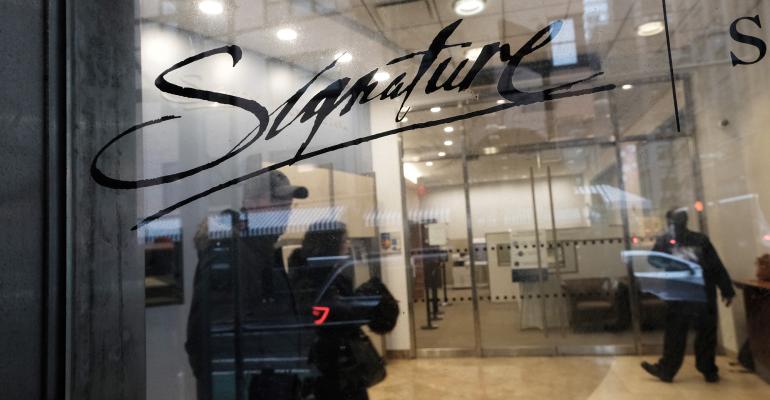(Bloomberg)—Signature Bank’s partial takeover by a competitor is notable for what it doesn’t include: $11 billion of loans against a class of New York City apartments whose values have tumbled in recent years.
In a deal with the Federal Deposit Insurance Corp., New York Community Bancorp Inc. is buying more than $34 billion in Signature’s deposits, as well as $13 billion in loans and 40 bank branches. Left behind is the commercial real estate debt portfolio, weighted heavily toward multifamily buildings bound by a law that restricts landlords’ ability to raise rents.
“It’s toxic waste,” said Christopher Whalen, chairman of Whalen Global Advisors. “From an investor point of view, these are dead assets.”
Signature owned more than $11 billion in loans against rent-stabilized apartments, according to public records analyzed by Maverick Real Estate Partners, which invests in commercial-property credit. The loans carry higher debt-to-value ratios than comparable portfolios owned by JPMorgan Chase & Co., NYCB itself and other banks, Maverick’s analysis of data from lenders and New York City’s Department of Finance shows.
Based on the analysis, “Signature’s loan portfolio has higher leverage than most of its peers,” said Ted Martell, co-founder of Maverick. “It has more risk.”
The loans in question finance rent-stabilized apartments, so called because price hikes are capped under state law. In the past, landlords were able to increase rents by larger increments when a tenant moved out, and buildings could become deregulated once rates rose beyond certain levels. But provisions of a 2019 law placed new restrictions on owners, limiting investor demand for the regulated properties.
“We witnessed in real time the valuation of buildings being cut in half,” said Jay Martin, executive director of the Community Housing Improvement Program, a Manhattan-based landlord advocacy group.
Government interventions during the pandemic, such as the Paycheck Protection Program and rental assistance, delayed some of the issues for landlords. Now, while the help from those initiatives is winding down, a sharp increase in interest rates has made it harder to refinance buildings.
The FDIC declined to comment. NYCB didn’t respond to a request for comment.
NYCB is already among the biggest multifamily lenders in the New York area, where it specializes in financing rent-regulated buildings. The Signature deal, which includes lines of credit to law firms and entertainment companies, enables NYCB to branch out into new businesses, Chief Executive Officer Thomas Cangemi said on a conference call Monday.
Meanwhile, NYCB may service Signature’s multifamily loans, which would provide opportunities to strike refinancing deals with select borrowers.
There’s another key reason for NYCB to leave behind the apartment debt that has nothing to do with the quality of the assets, said Herman Chan, an analyst at Bloomberg Intelligence. The deal helps NYCB reduce its loan-to-deposit ratio, bringing it more in line with regional banking peers, Chan said.
The FDIC could still find an acquirer for the loans. That buyer would likely need “a big discount, a strong stomach and an interest in buffering the local NYC economy,” said Kenneth Fisher, a member of Cozen O’Connor’s business law department who served on the New York City Council for a decade.
For borrowers, the takeover by NYCB eliminates a key source of financing at a time when lenders are scaling back their involvement in commercial real estate.
“Signature and New York Community were head-to-head competitors,” said Bob Knakal, senior managing director and head of the New York private capital group at brokerage Jones Lang LaSalle Inc. “Now there’s one less option.”
© 2023 Bloomberg L.P.

